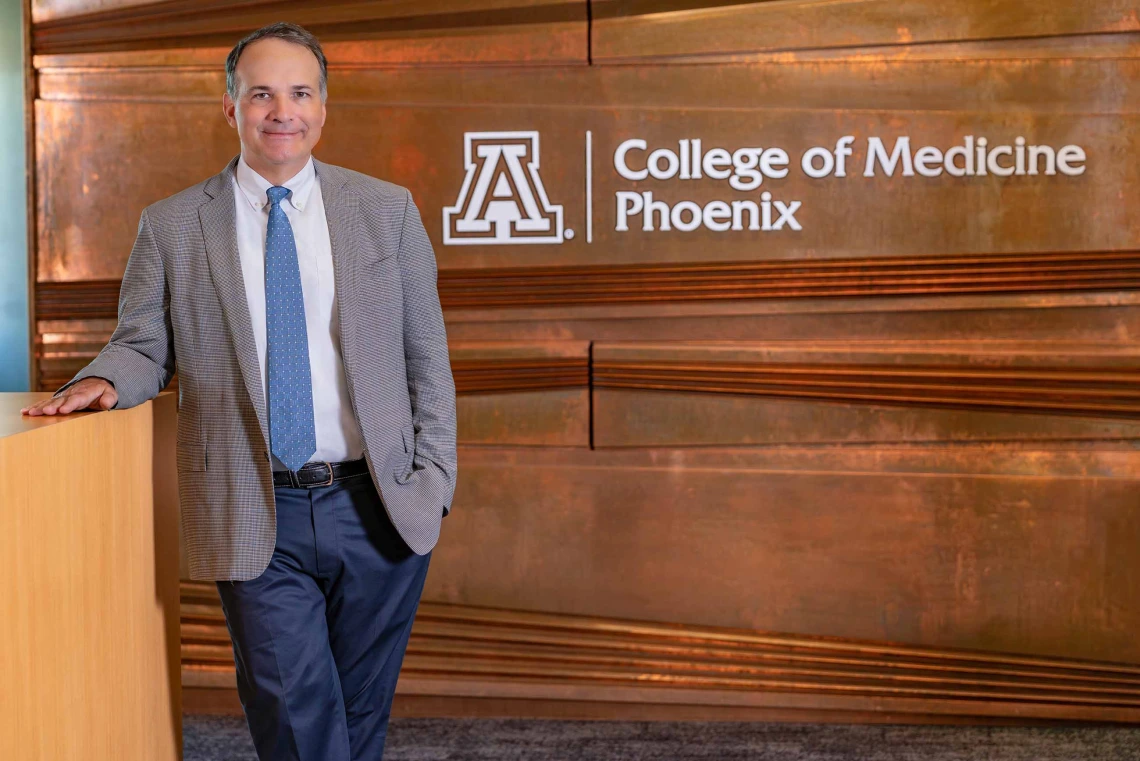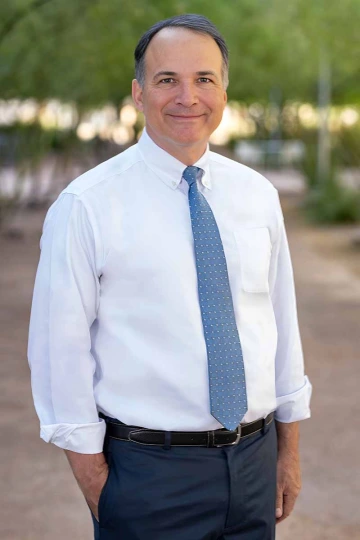Connecting with Dean Fred Wondisford
New dean of College of Medicine – Phoenix foresees exciting period of growth for the college in the state’s largest city.

University of Arizona College of Medicine – Phoenix Dean Fred Wondisford, MD
Photo by Shaun Mockoski, U of A College of Medicine – Phoenix
Fred Wondisford, MD, MS, MBA, took over the leadership of the University of Arizona College of Medicine – Phoenix in October 2023.
Health Sciences Connect recently caught up with Wondisford to discuss why he came to Phoenix, what the new ASU medical school will mean for the college, and why television repair changed his life.
What initially attracted you to the College of Medicine – Phoenix?
The first thing I liked about the college was the organization of the university. The president, Robert Robbins, MD, is a physician who had a vision for the College of Medicine – Phoenix. And then, of course, Michael D. Dake, MD, the senior vice president for the University of Arizona Health Sciences, is also a physician. So, the alignment within the university was attractive because it was physician-led. The resources here are also significant. As a school, we have several agreements with our distributed clinical partners that underpin our school's finances. The quality of the students here is really high. And, while it's new, it's not brand new.
What challenges will you focus on in the coming years?
The college started with a community-based care emphasis. In fact, our distributed educational model lent itself to community-based development because we have a number of clinical partners in multiple locations within and around Phoenix. The college also emphasized family practice because it is a specialty that brings together many aspects of medicine. As our college has matured, we have attracted renowned faculty in other medical specialties. They have built excellent teams, placing us in a great position to transition to a more research-oriented college. I think our evolution is going to be challenging, but quite attainable. We have a solid research base, which we're building upon, and we have the resources to build. I think that’s one of the main reasons I came here.

Fred Wondisford, MD
Photo by UArizona College of Medicine - Phoenix, Shaun Mockoski
Arizona State University announced last year that it would be creating a medical school in Phoenix. How does that impact the College of Medicine – Phoenix?
Arizona has a severe shortage of physicians. We are willing to collaborate with everyone to ensure the people of this state get the care they need. ASU’s medical school plans to focus on combining clinical medicine, biomedical science and engineering, which could complement our community and research-focused work. But Phoenix, for its size, has only a modest number of health care systems to serve many existing medical schools, regional medical campuses (Mayo Clinic and Creighton), and planned medical schools (ASU and NAU). In this environment, schools that collaborate will likely be more successful.
What impact will the new Center for Advanced Molecular and Immunological Therapies have on the college?
We will be a research powerhouse in neurosciences, metabolic disease and cardiology. We now have the new opportunity to build research collaboratively with CAMI in areas such as autoimmunity, infectious disease and cancer. Our relationship with the Alzheimer's Center at Banner Health will also advance early detection and personalized care. We select our research areas based on the needs of communities we serve and the ability to be distinguished in that area of research.
When the people of Phoenix or the state of Arizona think of the College of Medicine – Phoenix, what do you want that vision to be?
I want that image to be new and innovative. We don’t just train in Phoenix; we train students in Yuma, Flagstaff and Payson, all of those places where physicians are needed. We don't have enough physicians in Arizona, but we also know that the distribution of the ones that we do have is focused in two major cities. So, the regional medical campus concept and the outreach of training to underserved communities – that's what I'd like us to be known for.
If you could talk to yourself at your medical school orientation, what advice would you share with yourself?
I think I would say, “Follow your passion.” I chose endocrinology. I liked it. That's why I chose it. My father was a businessman, and he said you're crazy to choose that. Why don't you want to be a surgeon? The one thing I think I did in my career was follow my interests wherever they took me. I wasn't wedded to a particular specialty. I wasn't wedded to a particular location. I was interested in medicine as a career. I was also interested in research, even in medical school. I spent time in the lab as a first-year medical student. As things evolved, I became really interested in research and pivoted my focus to have more of a research career. If you follow your passion, you're not talking so much about pivoting later because you're doing something you liked from the beginning.
What is one thing no one knows about you?
When I was in high school, my father wouldn't fix our color television. He said, “You know, I'm not going to pay the TV repairman to fix the television. But if you want to learn how to fix it, I’ll buy the parts.” Since I really wanted to watch television, I went to the library, and I learned electronics by reading books. Then, I started running a little television repair business in high school, and I drove a TV repair truck when I got to college. I made a lot of money that way, and I met my wife (Sally Radovick, MD, director of the developing Clinical and Translational Research Institute). My friend, who was her roommate in medical school, said, “Oh, Fred can fix that television for you.” And that's how I met Sally.

